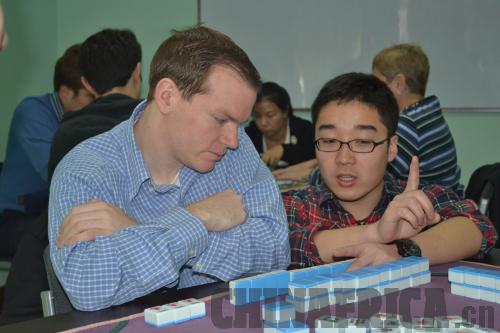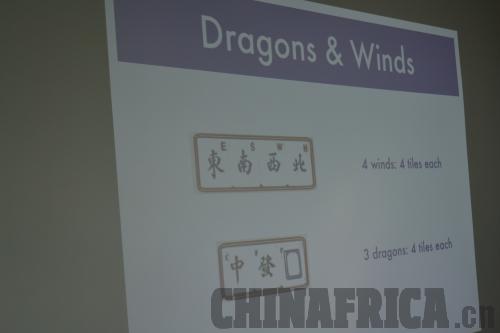|
 |
|
A teacher teaches participants the mahjong rules (LIU JIAN) |
The culture
For Cheremnikh, who came up with the idea of opening the mahjong workshop, this game represents contemporary Chinese culture.
"Culture is not just about traditions and history, but more about how people live, what people think, do and play," he explained. "I found playing mahjong was a big part of [Chinese] people's lives; it's not just for old people nowadays. It's kind of a game that everyone knows how to play, and also a lot of fun."
Instead of focusing on traditional Chinese things, he opened this mahjong workshop for foreigners to experience contemporary Chinese culture. "Just like visiting the Great Wall or eating Beijing roasted duck, playing mahjong is one of the must-dos for a genuine Beijing experience," he said.
"I want to play with the locals because that's one way to be part of Chinese local life," said Christine Morris, who came from England to teach English in Beijing several years ago.
She explained that the reason she joined the workshop is that she wanted to learn more about Chinese culture. "It's so Chinese. I didn't realize there was so much symbolism. Our teacher introduced us to some of the Chinese philosophies behind the tiles," she said.
According to Yu, originally, the "dragon" tiles are said to have something to do with the Chinese Imperial Examination. The red hongzhong tile means passing the examination to clear the way to officialdom, the green facai tile means wealth and prosperity and the white baiban tile means freedom from corruption.

Having fun
Many participants also enjoy the social aspect of playing mahjong. Morris learned how to play the game a year ago, but there weren't so many opportunities to play. At the workshop, she found more people who like to play together.
"I learned the basics and the name of the tiles, but I don't have any clever strategy. I just enjoy playing, the social aspect [of the game] and having fun," she said.
Morris also feels that since the game involves four people, it is a more social game than those with only two players. "It brings people together. When playing mahjong, there's a lot of personal communication. Especially when I play with Chinese people, I feel a certain bond between us," said Morris.
Água-Mel values special friendships based on the mahjong table. "We are from different age groups, working in different places. I'm happy that we have this mahjong going, and we meet regularly to play mahjong and go for a meal afterward. Probably if not for mahjong, we would not have such a nice friendship," she said.
With its immense popularity all over China, the rules of the game have tended to vary from region to region. Água-Mel lives on campus and she often plays with a couple of retired professors, and sometimes with some of her students, who come from different provinces of China. "Now I've learned all the rules from all the provinces. The learning itself is a lot of fun," she said.
So far, a few hundred foreigners have taken mahjong classes here. As foreigners become more and more interested in Chinese culture, the number of students in the class has grown, according to Cheremnikh.
Yet, he still feels that there is one element missing in the program. "Now we only teach, but we don't give many opportunities for practicing, for playing and for fun," he said, adding that he plans to start a mahjong club in the future so that people can come and play every week.
Mahjong classes are held at the Culture Yard, No.10 Shique Hutong, Beixinqiao, Dongcheng District |